A. T. Robertson Collection (15 vols.)
Digital Logos Edition
Overview
The 15-volume A. T. Robertson Collection contains the grammars, commentaries, lectures, and sermons of one of America’s foremost Baptist scholars. As a founding member of the Baptist World Alliance, a Greek scholar, and prolific preacher, A. T. Robertson devoted his entire career to equipping others for ministry. As one of the great New Testament scholars of his time, his works remain widely influential today—his Greek grammars are still used in seminaries, and his commentaries are still found on the shelves of preachers and teachers, reinforcing his place among the most influential Baptists in American history.
What’s more, with the Logos edition of these important volumes from A. T. Robertson, you can search for verses, find Scripture references and citations instantly, and perform word studies. Along with your English translations, all Scripture passages are linked to Greek and Hebrew texts. What’s more, hovering over a Scripture reference will instantly display your verse! The advanced tools in your digital library free you to dig deeper into the works of one of the most important Baptist preachers and theologians!
This title is included in the following collections
You can save when you purchase this product as part of a collection.
Logos 8 Baptist Bronze Legacy ...
$89.99$89.99Logos 8 Baptist Silver Legacy ...
$349.99$349.99Logos 7 Baptist Silver Legacy ...
$349.99$349.99Logos 6 Baptist Silver Legacy ...
$349.99$349.99
- $349.99
- $849.99
- $849.99
- $849.99
- $849.99
- $849.99
- $1,499.99
- $1,499.99
- $1,499.99
- $1,499.99
- $1,499.99
- $2,999.99
- $2,999.99
- $2,999.99
- $2,999.99
- $2,999.99
- $2,999.99
- $4,749.99
- $4,749.99
- $4,749.99
- $4,749.99
- $12,102.39$7,299.99
- $11,399.99
- $11,399.99
- $21,749.99
- $24,999.99

- Commentaries on Matthew, Luke, Acts, Philippians, and James
- Works on Greek grammar and textual criticism
- Numerous lectures and address
- The biography of John Albert Broadus
- Robertson’s 1916 Stone Lectures at Princeton Theological Seminary
- His works on the life and ministry and Paul
- Title: A. T. Robertson Collection
- Author: Archibald Thomas Robertson
- Volumes: 15
- Pages: 3,598
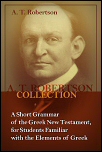
B. B. Warfield once called Robertson’s Greek scholarship “monumental,” and George Truett said he “would exchange a billion dollars” for one of his grammars. Robertson devoted his life to the genius of the Greek language—its history and the individuals who have used it for speaking, writing, exegesis, and interpretation. At the time of publication, Robertson had taught Greek for twenty years and studied Greek for more than thirty. He wrote A Short Grammar of the Greek New Testament at the request of students, pastors, and colleagues. It became a standard textbook in many seminaries and was translated into a dozen languages.
This volume contains an introduction to modern linguistics and Greek pronunciation. Robertson also includes chapters on declensions, the principal parts of numerous verbs, a discussion of Greek syntax, the Greek article, prepositions, the moods, tenses, and voices of verbs, as well as clauses, participles, and Greek idioms.
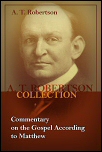
Throughout the nineteenth century, biblical studies progressed and expanded, with the onset of new forms of criticism and the emergence of the historical consciousness. This volume is Robertson’s attempt to bring divergent views and interpretations on the Gospel of Matthew together into one volume. He offers a comprehensive commentary that is both compact and clear. In addition to discussions of canonicity, authorship, and historicity, this verse-by-verse commentary also outlines the characteristics and purpose of the book, as well as its theology and Christology.
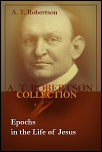
Scholarship in recent centuries has revealed much about the history and culture of Palestine during the time of Christ. This volume attempts a straightforward and constructive discussion of the career of Jesus as it is set forth in the Gospels. Derived from a series of eight lectures delivered in Pertle Springs, Missouri during July, 1906 to an audience of ministers and students, Robertson uses the events of Jesus’ life to illuminate his purpose and mission. He discusses the historical context, Jesus’ relationships, and Jesus’ interactions with his disciples to outline a comprehensive history of Jesus ministry.
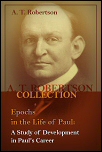
The widespread success of Epochs in the Life of Jesus prompted Robertson to offer a treatment of Paul’s life in the same manner. In this companion volume, Robertson does not offer critical or textual discussions. Instead, he gives an honest and constructive account of Paul and his work in Acts and the epistles. Beginning with Paul’s life before his conversion, and chronicling his missionary efforts, arrest, and imprisonment, Robertson approaches Paul using all available resources: his own environment, his intellectual and spiritual reflections, his relation to Jesus, and his literary remains all illustrate the development of his theology and the journeys of his life.
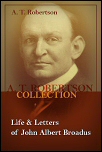
A. T. Robertson forged a special relationship with John Albert Broadus. He served as his teaching assistant, married his daughter, and succeeded him at The Southern Baptist Theological Seminary as Professor of New Testament Interpretation. Using letters and correspondence—nearly 25,000 materials in all—Robertson tells the story of John Albert Broadus, using his letters to reveal the person and character of one of the greatest Baptist theologians. This volume contains chapters on Broadus’ childhood, family life, and education, as well as his prolific preaching ministry and lengthy tenure at The Southern Baptist Theological Seminary.
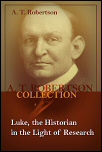
Throughout the nineteenth century, historical research and the rise of higher criticism inspired a new interest in the Gospel of Luke. In this volume, derived from a collection of lectures delivered at the Northfield Christian Workers’ Conference in 1919, Robertson defends supernatural origin of the Bible in general and the inspiration of Luke in particular. He discusses the authorship and dating of Luke and Acts, the source material, the evidence of Luke’s medical background, and archaeological and geographical data. This volume also includes a complex topical index.
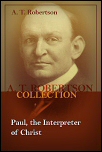
This volume supplements Robertson’s life story as told in Epochs in the Life of Paul, and explores the various aspects of Paul’s life and teaching which have inspired present-day interest. Paul, the Interpreter of Christ includes chapters on Paul and the sacraments, the church in Corinth, ecclesiastical independence and unity, Paul’s missionary efforts, and the relationship between Paul and Greek culture.
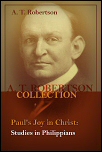
Many modern critics fail to understand Paul because they fail to understand Jesus, and therefore do not know Jesus as Paul knew him—a critical error. In Paul’s Joy in Christ: Studies in the Philippians, Robertson asserts that “nowhere is the tender side of Paul’s nature better shown than here: his delicacy, his courtesy, his elevation of feeling, his independence, his mysticism, and his spiritual passion.” This volume is derived from a series of lectures delivered at the Northfield Conference for Christian workers in August, 1913.
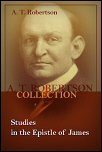
The epistle of James offers profound advice for everyday life and contains “the breath of heaven and the warmth of human sympathy and love.” In August, 1912, Robertson delivered a series of lectures on practical aspects of ethics as found in the book of James. He repeated these enormously popular lectures in 1913 at the Winona Bible Conference, and this volume is the result of many requests for publication. In addition to introductory material, this volume includes expanded versions of those lectures, and is written for ministers, students of the Bible, and teachers. Technical language and the Greek text are placed in parentheses and footnotes, making this volume accessible for English-only study.
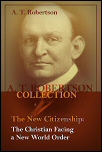
In this volume, A. T. Robertson reflects on the issues and challenges facing the church in the early twentieth century—the years of war, economic turmoil, the relationship between church and state, patriotism and pacifism. He explores the implication of Christ’s kingdom with regard to each challenge the church faces, and suggests possibilities for engaging complex issues. The posture and approach of his engagement with culture serves as a model for the church in every age.
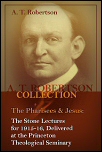
A. T. Robertson delivered the Stone Lectures at Princeton Theological Seminary, and this volume includes the original content of those lectures, revised and expanded. In these lectures, Robertson investigates the relationship between the Pharisees and Jesus not only as a subject of mere academic interest, but as an issue of vital importance that affects how one perceives the historic origins of Christianity.
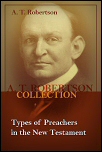
A. T. Robertson contends that “the Word of God is not bound by human shackles,” and that God uses ordinary people from diverse backgrounds to preach and teach. This volume examines the lives and teachings of fifteen minor characters in the New Testament to determine the nature of biblical preaching, including Apollos, Barnabas, James, Philemon, Stephen, Lydia, Silas, Titus, Timothy, Thomas, Philip, Matthew, Judas, Diotrephes, and Epaphroditus.
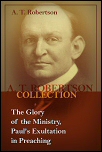
In The Glory of the Ministry, Paul’s Exultation in Preaching, A. T. Robertson affirms preaching as the central task of the pastor. He also affirms the work of preaching as a life-long worthy calling and allays skepticism that a shortage of preachers indicates disinterestedness in the Gospel.
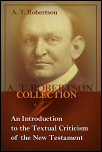
In this volume—dedicated to B. B. Warfield—Robertson explains the purpose and uses of textual criticism for exegesis, interpretation, and preaching. Following in the tradition of Westcott and Hort, he explains textual principles for students of Greek, as well as for a wider audience.
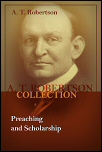
Can scholars preach? Should scholars preach? What is the relationship between intellectual cultivation and thoughtful preaching?
In his inaugural lecture at Southern Baptist Seminary in 1890, A.T. Robertson clarifies the relationship between scholarship and preaching. He contends that objections to theological education usually arise from ignorance about the real workings of seminaries. This address counters the prejudice against higher learning, and shows that it is not only possible, but preferable for someone to become a respectable scholar and remain a preacher. Moreover, says Robertson, we cannot underestimate the work of the Holy Spirit during intellectual pursuit.
Archibald Thomas Robertson was born on November 6, 1863 in Chatham, Virginia, during the height of the Civil War. His family moved to Statesville, North Carolina, where he grew up. He was baptized in 1876 and immediately recognized God’s call to preach, and attended Wake Forest College.
Upon graduation in 1885, Robertson entered The Southern Baptist Theological Seminary, where he devoted himself to Greek studies under John Broadus. He was appointed Greek instructor as a student, and received his Th.M. in 1888. Robertson became an associate professor in 1890, and then served as Professor of New Testament Interpretation from 1895 to 1934. He devoted his life to preaching, teaching, scholarly activities, and giving public lectures, many of which have been reproduced in book form in this collection. He was a founding member of the Baptist World Alliance, and participated in numerous Bible conferences with Dwight Moody and F. B. Meyer.